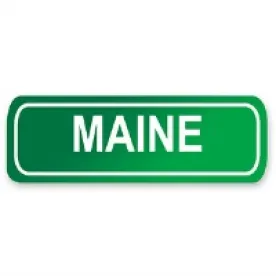The Maine Department of Administrative and Financial Services (DAFS), which houses Maine Revenue Services (MRS), has proposed a bill that would make significant changes to Maine’s corporate income tax and service provider tax. Most significantly, L.D. 2011 would subject streaming services to the service provider tax, enact factor-presence nexus for corporate income tax purposes, and conform to the 80% federal net operating loss (NOL) limitation. L.D. 2011 was referred to the Legislature’s Committee on Taxation in the House of Representatives on January 14, 2020.
Streaming Services Taxed. Maine already imposes sales and use tax on “products transferred electronically”—that is, any digital product that would have been taxable as tangible personal property if transferred in a nondigital form. In practice, only digital products purchased for permanent download are taxed. L.D. 2011 would tax digital audio and audio-visual works transferred for less than permanent use, including use conditioned on an ongoing subscription—e.g., subscription streaming services such as Netflix and Spotify.
It is notable, and problematic, that rented or streamed audio and video would be subject to Maine’s service provider tax, a tax that is imposed on the value of specified services that is separate from sales and use tax. The effect is to tax digital audio and video at different rates, depending on how the content is transferred. Products transferred electronically, such as a downloaded movie, would be subject to the 5.5% sales tax. Less-than-permanent audio or audio-visual works, such as a 72-hour rental of that same movie, would be subject to the 6% service provider tax.
The bill also proposes a sourcing hierarchy for the sale of digital audio-visual and audio services. Under the hierarchy, the sale would be sourced to the location where the content is first used, if known. The remainder of the sourcing rules mirror the sales tax sourcing rules in 36 M.R.S. § 1819. If enacted, the service provider tax would apply to digital audio-visual and audio services beginning on October 1, 2020.
Factor-Presence Nexus. L.D. 2011 would enact a factor-presence nexus standard for purposes of Maine corporate income tax. Under the bill, a corporation that is not organized or commercially domiciled in the state would be treated as having substantial nexus with Maine if it has over $250,000 of property, $250,000 of payroll, or $500,000 of sales in the state—or, if any of the three factors exceed 25%. For purposes of sales factor presence, sales would include any sales subject to Maine’s throwout rule (i.e., sales to a purchaser not taxable in Maine).
L.D. 2011 would also treat a corporate partner of a pass-through entity that has substantial nexus with the state as having substantial nexus itself. This would codify MRS’s rule 801.07, which already subjects corporate partners to Maine income tax if they own an interest in a pass-through entity that, if treated as a corporation, would be subject to Maine income tax.
There is currently no statutory substantial nexus standard in Maine; however, MRS’s Rule 808 treats any foreign corporation that does business in the state as having nexus in Maine for corporate income tax purposes. DAFS states that the factor-presence nexus thresholds are intended to clarify and simplify corporate income compliance “by establishing clearly defined, objective nexus thresholds as a practical structure for the current general ‘economic nexus standard.’” It is not yet clear whether the objective statutory standard is intended to supplant MRS’s broad and subjective nexus rule.
If enacted, the factor-presence rules would take effect for tax years beginning on or after January 1, 2021.
80% Limitation on NOLs. Under the Tax Cuts and Jobs Act of 2017, a new 80% limitation applies to net operating losses generated in tax years beginning January 1, 2018. In 2018, the Maine Legislature specifically decoupled from this limitation, allowing taxpayers to use NOLs to offset up to 100% of their federal taxable income. L.D. 2011 would reverse the 2018 Legislature’s action, conforming to the 80% limitation retroactively to January 1, 2018.
L.D. 2011 also proposes inflation indexing provision for certain individual income tax provisions.




 />i
/>i

